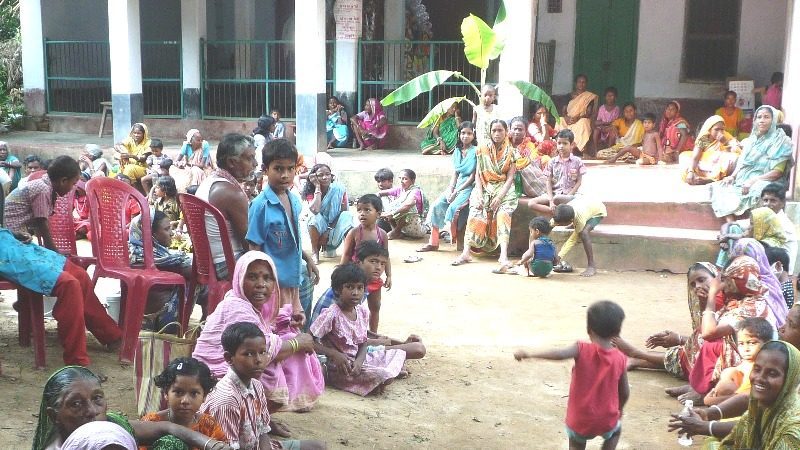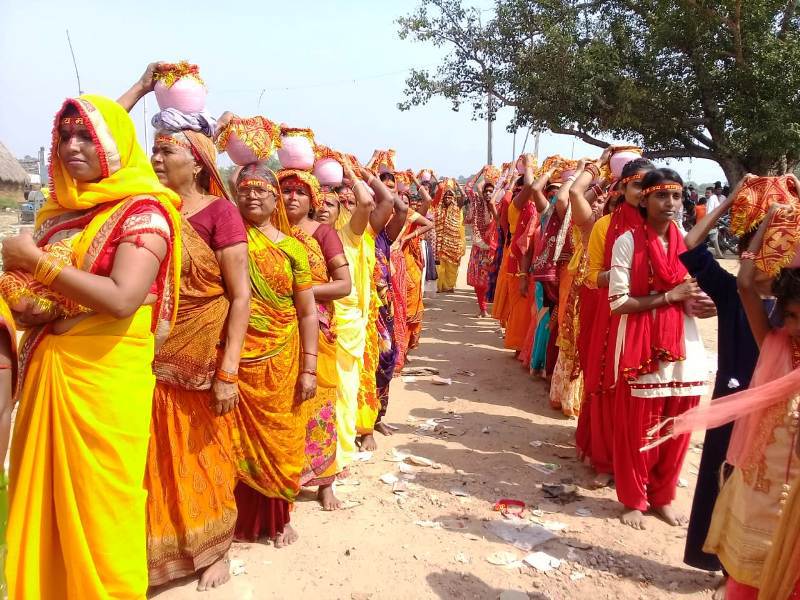Ambedkarism rejects dwij traditions in their entirety but they are being followed in the Dalitbahujan settlements. It is happening in many places in the country. An instance is a Dalit settlement in Babuganj is a small hamlet in Phulpur Block in Allahabad District of Uttar Pradesh State, where, during Dussehra, a person called Deepchand installed an idol of savarna goddess Durga and splurged thousands of rupees on the event.

It was due to the attraction for savarna gods and goddess that this settlement witnessed a large crowd on the occasion of Dussehra. As most of the residents of the village are labourers, aarti and the other rituals are organized late in the night. Deepchand is a decorator. When asked how much he spent on the event and from where the money came, he was evasive. “More than Rs 20,000 were spent on pandal, idol etc. A part of it came back in the form of offerings made by the people and the rest was managed with the blessings of the goddess.”

Dalitbahujan women make preparations for Durga Puja
Deepchand may have spent a huge amount on Durga Puja but his economic condition is nothing to write home about. Due to lack of money, he has admitted his children to a government school. The village we are talking about has a savarna settlement. But this year Durga idol was not installed in the settlement. Durga Puja was organized in only two homes in the village – Deepchand’s and Raghunath’s – both in Kurmi settlement. Members of the Vaishya community organized Durga puja at two places outside the village. For the past 40 years, Ramlila is being staged in the village.
The trend of organizing jagratas and playing orchestra during Durga Puja is growing in the village. And this is not an isolated case. The trend is catching up in the remote rural areas too and has come about in the past 4-5 years.

And it is not only about Durga Puja. Over the past several years, many Dalits in the village have adopted other Brahmanical gods and goddesses rituals and customs. For instance, after two boys of the Bharatiya (Paasi) settlement were recruited in the army, their family members organized a ‘bhandara’ and offered ‘joda nishan’ at the Hanuman and Pandila Mahadev temples at Bandhwa. They spent lakhs. Earlier, such rituals were organized only in savarna homes.
The growing attraction for dwij traditions among the Dalitbahujans shows that, shunning their own culture, they are falling into the trap of the dwij culture which has been synonymous with their exploitation for centuries.
Translation: Amrish, copy-editing: Lokesh
Forward Press also publishes books on Bahujan issues. Forward Press Books sheds light on the widespread problems as well as the finer aspects of Bahujan (Dalit, OBC, Adivasi, Nomadic, Pasmanda) society, culture, literature and politics. Contact us for a list of FP Books’ titles and to order. Mobile: +917827427311, Email: info@forwardmagazine.in)
The titles from Forward Press Books are also available on Kindle and these e-books cost less than their print versions. Browse and buy:
The Case for Bahujan Literature
Dalit Panthers: An Authoritative History






